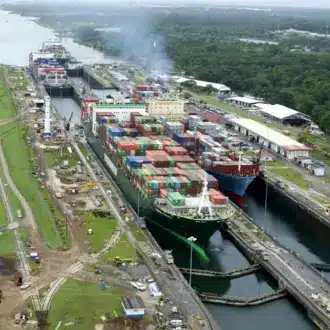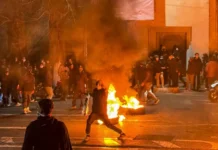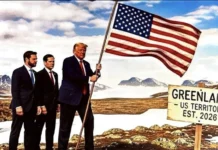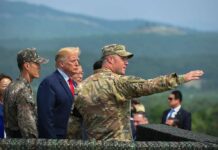Deal to sell port contracts to BlackRock of US is being blocked by Beijing
Dikang and Li Yong, chinaworker.info
Donald Trump declared his designs on the Panama Canal on day one of his return to power. “We didn’t give it to China. We gave it to Panama, and we’re taking it back,” he said in his inauguration speech. The claim that “China” controls the canal is a reference to Hong Kong tycoon Li Ka-shing’s port business CK Hutchison, which operates the two ports, Balboa and Cristóbal, at each end of the 82-kilometer waterway. Trump has made no secret of his desire for territorial expansion, with Greenland and Canada among his other targets. This marks a return to 19th Century-style neo-colonialism.
The Panama Canal is itself a symbol of colonialism and the rise of the US to become the world’s major imperialist power. As part of the groundwork for the canal, which was completed in 1914, the US government of Theodore Roosevelt sponsored Panama’s secession from Colombia in 1903 (Greenland take note!).
Trump told the US Congress that the canal was “built at tremendous cost of American blood and treasure”, but the work was performed mostly by black migrant labourers from Caribbean colonies. It is known as the world’s deadliest ever construction project, killing 40 percent of its workforce. The US kept control of the canal until 1999, when it was returned to the Panamanian government. With $270bn of cargo passing through the canal every year, it accounts for 4 percent of Panama’s GDP. 40 percent of all US container traffic goes via the canal.
“Hemispheric Control”
Almost all of Trump’s territorial claims have a China connection. “Trump’s Greenland obsession is all about China” was a headline in The Nation, an American monthly. As with the US-China trade war, this poses a serious dilemma for the CCP (so-called Communist Party) regime, which has a huge economic footprint in Latin America. Xi Jinping understands that this is not just about the canal, or Panama, which are of course strategically important from a trade perspective. This tug-of-war is about a much bigger prize for both imperialist governments.
Li Ka-shing, whose business empire is caught up in the geopolitical crossfire, wanted to extricate himself by selling his 80% stake in the Panama Canal ports (plus dozens of ports in other countries) to a global consortium led by US financial company BlackRock. Any deal must be ratified by the Panamanian government. The 96-year-old tycoon, whose net worth is $37.4 billion USD, could sense this was an opportune time to cash out. It is not just that Panama risks becoming a black hole for Chinese capital, but also that Trump’s wider trade war agenda, with seaborne cargo currently in huge decline, could decimate the profitability of ports around the world. However, Li’s move, evidently negotiated without the full knowledge of the Chinese regime, has been blocked by Beijing.
The Trump administration has been twisting the arm of the Panamanian government to expel “the Chinese” in order to set an important precedent. This would strike a blow against China and its economic interests in Latin America as a whole. In February, just prior to a first visit by Trump’s Secretary of State Marco Rubio, the Panamanian government of José Raúl Mulino gave Beijing 90 days’ notice of its intention to quit China’s strategic Belt and Road Initiative (BRI). For the CCP, this is actually a bigger blow than Hutchison relinquishing control of the canal ports.
In 2017, Panama was the first Latin American country to join the BRI. This occurred at the same time as it severed relations with Taiwan in favour of Beijing. The CCP fears a domino effect of Latin American countries pressured by Trump to scale down their links with China, and an erosion of the BRI on the continent.
The problems for China and the BRI are not just about Trump’s pressure campaign. The overall view of the BRI has soured in Panama as several Chinese-run projects have been delayed, entangled in labour conflicts and disputes over murky finances. The CCP fears that of the 21 Latin American and Caribbean countries remaining in the BRI, several others are wavering.
This is connected to wider global processes and the impact of Trump’s aggressive trade tactics. Trump has imposed uniform 10 percent tariffs on all Latin American countries (except Mexico which has faced a separate campaign) and Xi’s regime clearly hopes to capitalize on this by striking new deals with the continent’s many disgruntled governments. But China’s exports to these countries are already at such a high level it is hard to increase them further. Many of these governments have already taken or are discussing taking their own protectionist measures against Chinese goods.
Mulino’s government also initiated an audit of the port contracts, clearly under Washington’s pressure, which delivered its report in April citing “many breaches” of contract by CK Hutchison. The legal repercussions from this could result in heavy fines and even cancellation of the contracts, regardless of what happens with Li’s efforts to offload the ports.
All such moves take place in the shadow of the Trump regime’s determination to secure de facto control over the canal, which is ultimately about geopolitics—“hemispheric control” as extreme right Trump supporter Steve Bannon says—and not about alleged “overcharging” or the economics of the canal. Under Panama’s treaty with the US, whereby it regained control in 1999, the US still reserves the right to intervene militarily if the canal’s “neutrality” is compromised. While a new invasion (the US last invaded Panama 35 years ago) isn’t in the cards today, it cannot be ruled out at a later stage.
What is Beijing’s angle?
The CCP sees Li’s deal as damaging to its own interests in the global power struggle with US imperialism. This is another example of how private sector tycoons in China (and Hong Kong) are allowed to wield enormous economic power and become obscenely rich, but they are not allowed to step on the toes of the state. The state and its “national security” take priority over business and profit.
This is now a growing global trend. As the era of neoliberal globalisation has faded and given way to inter-imperialist conflict and economic protectionism, governments in the US, Europe and elsewhere are increasingly blocking or restricting certain types of business activity in the name of “national security”. US restrictions on Nvidia selling its chips to China are an obvious example—these rules have cost the US company billions of dollars in lost business. Because China is a dictatorship it has even greater powers to put companies in their place (see our articles on chinaworker.info dealing with Chinese state capitalism).
In March, a $22.8bn USD deal was announced whereby Li’s CK Hutchison Holdings would sell its port operating rights in Panama, along with similar contracts in Britain, Netherlands, South Korea and other countries, to BlackRock. What is notable is the way the CCP registered its opposition to this deal. Rather than taking the matter head on with an official statement, the CCP launched a guerrilla-style campaign through its media and local state offices in Hong Kong.
Ta Kung Pao, a CCP newspaper, published a series of commentaries denouncing Li Ka-shing for “betraying and selling out all Chinese people” and emphasizing that the investment practices of Hong Kong capitalists should “be consistent with national interests.” The Hong Kong and Macau Affairs Office and other top CCP-controlled agencies in Hong Kong reposted these articles, indicating a high level of official backing, to increase pressure on Li. The articles hinted at action to block the deal on “national security” grounds. Shares in Hutchison fell sharply in Hong Kong, which was the intended effect.
The CCP’s use of indirect tactics could reflect several things. Possibly, it had been blindsided by the deal and was not yet clear about what to do. Possibly it wanted to “hide and bide” by avoiding an official proclamation, unsure how the wider conflict with Trump would play out. Any such caution was blown away after ‘Liberation Day’ 2 April, when Trump unleashed his massive trade war.
The CCP has put the Blackrock deal on hold pending an “anti-monopoly” review. The deal was originally due to be signed on 2 April. Xi’s regime wants to use the Panama issue as a bargaining chip in its wider trade war negotiations with the US (talks are reported to start in Switzerland on 9 May). Hence its anger at Li Ka-shing for jumping the gun and threatening to deprive Beijing of a valuable chip.
Given the geopolitical context (Panama is in the “backyard” of US imperialism and heavily dependent on its economy) the CCP must realise that it is only a question of how and when the port contracts are given up, but that this is inevitable. It hopes to use this as a sweetener for a bigger deal with Trump to de-escalate the current crippling trade conflict (to what degree de-escalation is possible is another question). The media mauling of Li Ka-shing is intended to deliver a message to other private sector capitalists not to interfere with Xi Jinping’s conduct of the geopolitical power struggle with Trump. This is tantamount to saying “everything has to go through the strongman leader”—mirroring the current political setup in the US.
Against all imperialism
The media attacks on Li Ka-shing reveal a lot about the current mentality of China’s rulers and the CCP’s extreme right nationalist online chorus. Li was accused of “selling out the motherland”. But the ports are in Panama—so unless Li is revealed to be a Panamanian national, this accusation doesn’t make any sense. All the port contracts (43 in total) that Hutchison plans to sell are overseas. None are in China or Hong Kong. Clearly, therefore, this is about China’s own neo-colonial possessions in countries like Panama. When the CCP and China’s right-wing nationalists rage about “betraying the Chinese people”, they are really defending China’s right to be an equally aggressive imperialist power as Trump’s America with no regard for the people of Panama and other “small countries”.
For socialists, the issue is very clear. We believe the Panama Canal, its ports and all related businesses, should not be owned by foreign capitalists. They should be fully nationalised and placed under the democratic control of the working class. The workers’ movement in Panama should call for solidarity from workers in the US, China, Hong Kong and elsewhere to resist the competing imperialist agendas of Trump and Xi, including the possible threat of US military intervention. In the era of turbocharged imperialism, workers need their own independent program and plan of action.




